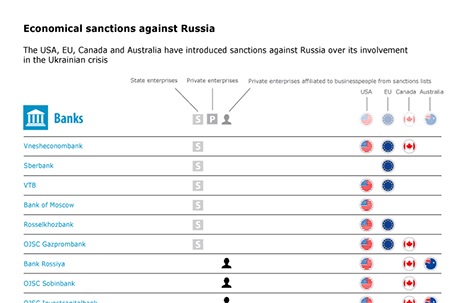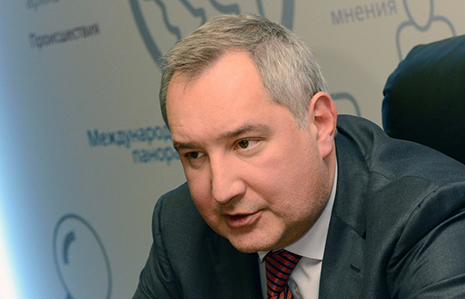"Analysis of US sanctions against the Russian defense industry indicates that discriminatory measures are being taken against those of our enterprises which either outperform their American analogues or are at least as good," Rogozin wrote on his Twitter account.
"These unlawful sanctions are dictated by unfair competition or even simple envy with traces of panic," Rogozin said.
Plans to expand sanctions against Russia will be considered in Brussels on Friday by US Vice-President Joseph Biden and leaders of the European Union.
In the Belgian capital, Biden is slated to meet top European leaders to discuss boosting security and financial aid to Ukraine and tightening economic sanctions on Russia, senior US administration officials said earlier.
Sanctions against Russia and its counteraction
Russian officials and companies came under the first batch of Western sanctions, including visa bans and asset freezes, after Russia incorporated Crimea in mid-March 2014 after a coup in Ukraine in February 2014.
The West announced new sectoral penalties against Russia in late July 2014 over Moscow’s position on Ukrainian events, in particular, what the West claimed was Moscow’s alleged involvement in mass protests in Ukraine’s war-torn southeast.
In response, Russia imposed on August 6, 2014 a one-year ban on imports of beef, pork, poultry, fish, cheeses, fruit, vegetables and dairy products from Australia, Canada, the European Union, the United States and Norway.
New punitive measures against Russia were imposed in September 2014.
A system of import substitution had to be introduced in Russia in connection with imposition of Western sanctions on Russia for developments in Ukraine and Moscow’s countersanctions.
Russia has constantly dismissed accusations of "annexing" Crimea, because Crimea reunified with Russia voluntarily after a referendum, as well as allegations that Moscow could in any way be involved in hostilities in the southeast of Ukraine.
Russian Prime Minister Dmitry Medvedev said October 30, 2014 that while pursuing a policy of import substitution, Russia should not confine itself to replacement of goods imports but should also focus on substitution of foreign developments.
In his address to the Federal Assembly, Russia`s parliament, on December 4, 2014, Russian President Vladimir Putin said that the import substitution policy is among the country’s long-term priorities.
















































